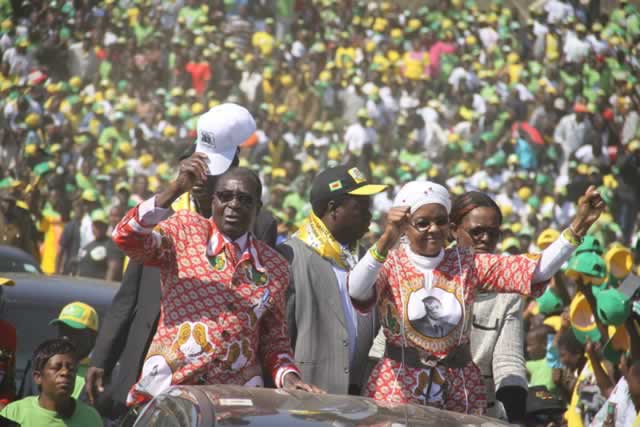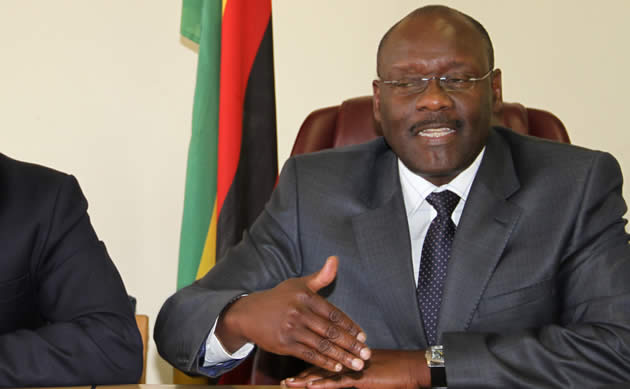ZIM REVOLUTION AND THE MUGABE LEGACY

REASON WAFAWAROVA
Last week newzimbabwe.com published an article titled “President Mugabe’s Balance Sheet,” by one Dinizilo Mbiko Macaphulana, a self-professed intellectual whose wide reading is far less questionable than his analysis. There are points in Macaphulana’s essay that I will agree with, and there are some assertions I will question, strictly from a phrenic perspective, and that includes some arguments that do not even rise to the level of nonsense; like the suggestion that Robert Mugabe, Kwame Nkrumah and Idi Amin all fall in the same class of villainous notoriety.
Macaphulana starts by writing about Robert Mugabe’s “political personality,” and his “political project,” and says the two are “bound to arrest the attention of thinkers and writers for a long time to come.”
Robert Mugabe is not just one of the founding fathers of post-colonial African independence. He is a principled ideologist whose policies have created the legacy of Mugabeism, and like every other lasting ideologist, there will be admirers and disputants to his ideas. One sure fact is that Mugabeism will be immortalised by both sides of the divide, and as Macaphulana writes, thinkers and writers will be seized with Mugabeism for a very long time to come, far and beyond the man’s death.
Macaphulana correctly says reactions to Mugabe’s legacy “range from worship to caricature,” but he does not realise that what is idolised by some, and abhorred by others is not Robert Mugabe the political person, but the revolutionary principles and ideas for which the man stands.
Indeed to his critics Robert Mugabe is a detestable villain who painstakingly carries an image of a monster so immune to mortality, and his long life becomes a bitter pill to swallow. Yet for his many admirers in Africa and across the world Mugabe is the arbiter of social justice, the voice of the oppressed, the ambassador of equality in international affairs, and the darling brave one who knows how best to tell bullish supremacist Westerners that slavery and colonial dominance are dead and buried in the world of the modern day African, dead like white occupation of farmlands in Zimbabwe.
As for Zimbabweans, the consensus on Mugabe’s land reform policy is certainly unquestionable. Even those that have ferocious political differences with Mugabe, to the extent that they publicly pray for his death; they stand united with his supporters in saying that the land reform policy is a noble idea, and that there will never be a reversal of land redistribution.
The dispossessed white community are now a mixed lot, with pragmatists accepting reality, and hard-core racists still hankering for a reversal miracle to the ruthless tide “the senseless land grab” program was.
One incisive comment Macaphulana makes is that not many people realise “how much of all of us is in Mugabe, and how much of Mugabe is in all of us.” When Mugabe declared that those who stole land from our forefathers would in equal measure lose it to this generation, masses flocked to occupy colonially stolen land. Western media labeled the move populist, but what that part of history taught us was how many of us Zimbabweans were in Mugabe.
When Zimbabweans in the Diaspora face racially inclined difficulties at work place or in societies where they live, it is common to hear them say “Mugabe is right about these people,” perhaps showing how much of Mugabe has been planted in us.
Just about every single Mugabe action has become newsworthy, especially for the white-owned South African media and the Zimbabwean private media, and that is why even his sweating on an extremely hot day attracted headline news at the recently concluded Congress.
It really does not matter how much one agrees with Mugabe’s politics or not, the fact of the matter is that he was endorsed by his party as the candidate for the 2013 elections, and that he went on to secure a 61% majority win in the subsequent election, a result endorsed by both SADC and the African Union. His defeated opponents may have made spirited claims of fraud, but they have not provided any evidence to prove their point.
It is a fact that Robert Mugabe commands standing ovations at almost all public gatherings he attends across Africa, as happened at Mandela’s funeral and at Uhuru Kenyatta’s inauguration, just to name a few such occasions.
Robert Mugabe is the current SADC chairperson, and the AU deputy as well, and of late Western delegations have been calling on his doorstep in the name of reengagement, perhaps realising that the 14-year-old sanctions have essentially failed as a leverage weapon. With all these developments, Macaphulana’s intellectual conclusion is that “Mugabe’s friends are getting fewer by the day.”
Whether this is a wish or a fact remains the reader’s prerogative, but anyone that suggests that Mugabe’s friends are getting fewer in Zimbabwe will have to explain the dominance of ZANU-PF on the local political landscape. Even the rival factions in ZANU-PF are way more relevant politically than all opposition parties combined. Macaphulana would do his readers a great service providing evidence of Mugabe’s dwindling support, and one hopes he will do so in his upcoming piece of writing.
Just like Mthulisi Mathuthu once accused Mugabe’s supporters of “national idiocy,” Macaphulana has no kind words for those that are amazed by Mugabe’s political prowess.
He angrily declares that he wants to “argue that there is nothing amazing about Mugabe and the many events and incidents that he occasioned.”
By his own admission, Macaphulana says the amazing thing about Mugabe is that everything “around the person, family, party, and country of Mugabe,” has amazed “many of us.”
Here are the reasons given for Macaphulana’s rage over the Mugabe legacy. Mugabe is a product of the history of his generation, from the colonial conditions, to the heroism of bringing down the pillars of coloniality. Well, even Macaphulana himself is a product of his own history, including his ethnic background, and the educational institutions he attended. We are all products of some history, in one way or the other.
That Mugabe is considered an iconic liberator is without question, just like Kwameh Nkrumah, Julius Nyerere, Jomo Kenyatta, Keneth Kaunda, Patrice Lumumba, Samora Machel, Nelson Mandela, among others; are all regarded across the African continent.
Macaphulana hails the late right wing Kenyan political scientist Ali Mazrui, (a replica of our own late John Makumbe); pouring adulations on him for labeling Nkrumah a “Leninist Czar,” totally ignoring the outrage that followed that hysterical assertion.
The only reason Macaphulana agrees with Mazrui’s learned pontification over the Nkrumah legacy is his desire to “see Mugabe in the same light,” and we are told Mugabe’s crime is his “combative Pan-African rhetoric,” presumably meant to be a mocking description of Mugabe’s independent nationalism.
While Macaphulana grudgingly admits that Mugabe has “earned a lot of admiration and support in Africa and the global South,” and that he is a “a gallant fighter,” he wantonly asserts that the man is “identified with many mass graves.”
He does not bother pointing any of his readers to any single such mass grave, or even to who identifies Mugabe as such. Was this an oversight, or perhaps Macaphulana himself is just another evangelising combative writer with no respect for intellectual responsibility?
Most Zimbabweans know that the initiative to introduce First Lady Grace Mugabe on the political scene came from ZANU-PF members, particularly from Oppah Muchinguri and some of her colleagues in ZANU-PF’s Woman’s League. Some have speculated about President Mugabe’s role in all this, but we do not expect the prizewinner for speculation to hail from the intellectual community, and surely Macaphulana is aware of that. Who will do the thinking if intellectuals seize themselves with the business of speculation?
And how does a whole First Lady of an entire nation get “promoted” into the structures of some political party, even if such a party was ZANU-PF?
Are we supposed to believe that the social standing of chairing ZANU-PF’s Women’s League is higher than that of being the First Lady of Zimbabwe? This surely does not measure up to intellectual brilliance.
But the idea was to hit at Mugabe, so whether he likes or not, he promoted his wife to the lesser role of chairing the Women’s League.
The deriding of the person of Mugabe does not exactly take away the fact that the man has influence, and it is his influence that has made his wife an alternative for the women in ZANU-PF, and that reality is valid, with or without the endorsement of those outside the party.
The feeble-mindedness that says what happened at ZANU-PF’s 6th Congress constitutes a legacy crisis for Mugabe is understandable coming from Tendai Biti, Morgan Tsvangirai or any of Mugabe’s political rivals, even from Mutasa. However, when an intellectual emulates such a base assertion, it simply smacks of lazy thinking.
ZANU-PF has not suddenly started expelling members with this Congress, and neither does this drama eclipse any of the past infighting in the history of the party. ZANU survived the Nhari rebellion with its bloody assassinations in the mid seventies, it survived the Vashandi rebellion in Mozambique in 1978, it survived the Tekere exit in 1989, and the Makoni adventure in 2008. In 2004 at least 6 provincial chairpersons were expelled, and so were comrades like Professor Jonathan Moyo, and yet we have not seen any legacy crisis emerging from all this.
What Macaphulana underrates is the loyalty of ZANU-PF membership to their institution. Dr Joice Mujuru has been a member of that party for 41 years, and Dydimus Mutasa tells us he has been in the party for 57 years. Both of them have no observable intention to leave, just like the suspended and expelled members before them did not make any moves to leave, save for the adventurous Daniel Shumba, who has since tracked his way back into the party.
It is ZANU-PF that safeguards the interests of these people, not Mugabe the person. The party has a standing and influence its membership cannot do without. We see a lot of people like Macaphulana anointing themselves custodians for the collective conscience and feelings of everyone in ZANU-PF, telling us that these people are so hopelessly manipulated and subjugated by Robert Mugabe that they need intellectual liberation.
It is hard to see how Robert Mugabe perpetuates coloniality, unless we agree that every economic hardship is synonymous with coloniality. Zimbabwe’s economic hardships are a combination of inept leadership, corruption, and patronage, all in an environment of deadly economic strangulation by an angry Western leadership. But Macaphulana had to somehow quote Anibal Quijano, and so we have this contrived argument that Mugabe has recolonised Zimbabwe.
How does one recolonise a country by reversing colonial imbalances? Or are we supposed to agree with Macaphulana when he says “the rhetoric of decolonisation such as the nativist Zimbabwean land reform and economic indigenization actually mask deep coloniality and criminal imperiality”?
Our land reform program is national, and not “nativist,” and economic indigenisation cannot be sensibly described as a “mask of deep coloniality and criminal imperiality,” unless Macaphulana has no idea what coloniality means, or has not bothered to establish the factual realities of the land reform program in Zimbabwe.
Essentially, Macaphulana credits Robert Mugabe with individually giving people land, and he argues the gesture is a mere pretence to cover up Mugabe’s grand plan to recolonise Zimbabwe. He even audaciously invites all intellectuals and “the global thinking community” to such a nugatory debate.
Like everywhere else in the world, those with economic power control the political structures of a country, and Zimbabwe is no exception. There is a new breed of young ZANU-PF activists that is really disturbing. These are young elites with vast economic interests, and they are quickly asserting themselves in ZANU-PF’s power corridors, all pointing to elitist control of politics. This is the real threat to the Mugabe legacy, and to the nationalist revolution that ZANU-PF stands for.
To argue that the ousted people from ZANU-PF are victims of Mugabe’s individual machinations is to ignore the role of factional politics in ZANU-PF, and that line of thinking is as base as concluding that Mutasa’s winching over his political demise is motivated by the justice cause.
The man was just recently threatening all of us, saying he had powers to see what happens in our bedrooms. It is that kind of power he has lost, and not many Zimbabweans would wish such misplaced powers to be restored. Zimbabweans will refuse to be railroaded into idolising a fallen charlatan, just because he is wailing insults at Robert Mugabe.
It is important that we realise the difference between the award-winning Mugabe of the early nineties, and the derided Mugabe of today. We have to establish the obtaining political realities of the two eras, and only then can we make informed judgments on the Mugabe legacy.
Zimbabwe we are one and together we will overcome. It is homeland or death!
REASON WAFAWAROVA is a political writer based in SYDNEY, Australia










Comments